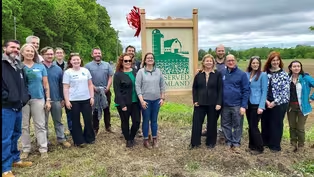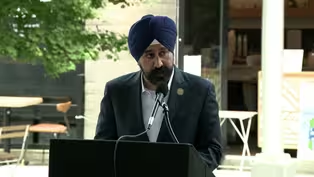NJ Spotlight News
The Change Talks: Trying to end homelessness in NJ
Clip: 5/17/2024 | 5m 6sVideo has Closed Captions
The fifth in a series of talks tied to The Change Project, an NJ Spotlight News series
Nonprofit leaders, social workers, volunteers and public officials are among the many trying to address homelessness in New Jersey. Groups like the Rescue Mission of Trenton are providing direct street outreach that includes food, clothing and medical care. Street outreach is often followed by housing support and behavioral health services.
Problems playing video? | Closed Captioning Feedback
Problems playing video? | Closed Captioning Feedback
NJ Spotlight News is a local public television program presented by THIRTEEN PBS
NJ Spotlight News
The Change Talks: Trying to end homelessness in NJ
Clip: 5/17/2024 | 5m 6sVideo has Closed Captions
Nonprofit leaders, social workers, volunteers and public officials are among the many trying to address homelessness in New Jersey. Groups like the Rescue Mission of Trenton are providing direct street outreach that includes food, clothing and medical care. Street outreach is often followed by housing support and behavioral health services.
Problems playing video? | Closed Captioning Feedback
How to Watch NJ Spotlight News
NJ Spotlight News is available to stream on pbs.org and the free PBS App, available on iPhone, Apple TV, Android TV, Android smartphones, Amazon Fire TV, Amazon Fire Tablet, Roku, Samsung Smart TV, and Vizio.
Providing Support for PBS.org
Learn Moreabout PBS online sponsorshipFinally tonight, a look at how New Jersey is trying to address a long standing issue.
Chronic homelessness affected nearly 2000 residents last year when the state conducted its annual point in time count.
That means they were without shelter for at least a year or repeatedly.
Another roughly 10,000 people were considered homeless.
But there are models that have proven effective in combating the problem.
Mental health writer Bobby Brier explores them in the fifth installment of our multimedia series, The Change Project, examining New Jersey's social and economic challenges, along with the actions making positive change.
Bobby This was such a beautifully done piece.
I just have to say that outright.
And so I want to know what were the models that you decided to look at and how did you narrow it down?
Because it seems like through your reporting, there are a lot of groups trying to do good.
Yeah, there really are.
And I think when you look at the most effective models across the state, there was a couple that really stood out.
One in particular to start off with is the street outreach, essentially.
There's programs like the Rescue Mission of Trenton and Mercer County that provide direct street outreaches like food, clothing and medical care six days a week to people experiencing homelessness.
They also often follow that up with housing, support services and behavioral health as well.
So there's that component of it.
But in addition to that, what those street outreach workers often do is that they build trust with people experiencing homelessness.
Many of those street outreach workers themselves have also been homeless as well.
So there's really an understanding between people that trust is often the key point to people taking that next step of getting into housing.
Oftentimes it takes years to build that trust, but it is that next step into getting into long term, sustainable permanent housing.
So there's that aspect of it.
And then there's a broader model that has seen success not just in New Jersey but across the country called Housing First.
And essentially, Housing First is putting somebody into a house or an apartment before anything else without any prerequisites going to a sobriety clinic or to a church service per se, but making sure that once they're in that house, they receive what they call wraparound services.
Essentially, those services are just things like constant mental health support from a therapist, making sure that they're budgeting their finances properly, medicine every every day if they need it.
Often that's with a social worker that's by their side every day.
So give them the stability first and then that enables them to address some of the other issues.
Exactly.
Yeah.
And once you have that stability, there's been success models throughout the state.
One in particular that I was able to see was at the Camden Coalition in southern New Jersey.
There's a man, Craig Kress, who first received housing from the coalition while still battling a substance use disorder.
But soon was able to go through a detox program and with the help of the Camden Coalition, has still remained housed eight years later.
That's often because of the daily work of outreach and clinical social workers that work.
That's one story, though, and we're talking about thousands of people.
And so what are the other examples that these are effective?
And ultimately, what's the big driver behind why people are homeless?
There's been a lot of other examples in terms of the success of the housing first model.
If you look at Newark right now, they've really done a good job of putting folks into remodeled and repurposed shipping containers that allow for them to start there and then eventually get into a more permanent home.
That model has shown success not just in Newark, in Camden, but also across the country.
If you look at a place like Houston, they've been able to house over 30,000 people since 2012.
That's largely because they have the space to build more housing, but also because they have city and state officials as well as nonprofit leaders, kind of all on the same page, looking at the same data, making sure that the people who need it most are getting where they need.
And so is it that intersection of mental illness that's causing folks to become homeless or chronically homeless or are there other factors at play?
That's one component of it.
I think there's a lot of other factors at play.
If you look at some of the most recent data coming out of the state, what drives homelessness at least from 2023, one was being asked to for people to leave a shared residence that's often maybe a domestic dispute or other reasons.
The second reason was eviction.
But there's also, we know, long standing issues, structural racism, domestic violence issues, as well as just the lack of affordable housing both here in New Jersey and across the country.
So so those are really the main issues right now.
Everyone can check out the full series on our website, NJ Spotlight Newstalk.
It is incredible.
Bobby, thank you so much for your reporting.
Thank you Bri.
Residents rejoice after warehouse development ended
Video has Closed Captions
Clip: 5/20/2024 | 4m 37s | State Agriculture Development Committee spent $27M to obtain land zoned for industrial use (4m 37s)
All eyes on gold bars in early days of Menendez trial
Video has Closed Captions
Clip: 5/17/2024 | 5m 22s | Prosecutors lead with ‘some of the most impactful evidence’ (5m 22s)
Hoboken mayor facing calls for investigation
Video has Closed Captions
Clip: 5/17/2024 | 4m 25s | The charges are contained in a lawsuit filed last week by a former city director (4m 25s)
Rutgers study: NJ Latinx students' barriers to college
Video has Closed Captions
Clip: 5/17/2024 | 4m 36s | Lower student access to guidance counselors is one indicator (4m 36s)
Providing Support for PBS.org
Learn Moreabout PBS online sponsorship
- News and Public Affairs

Top journalists deliver compelling original analysis of the hour's headlines.

- News and Public Affairs

FRONTLINE is investigative journalism that questions, explains and changes our world.












Support for PBS provided by:
NJ Spotlight News is a local public television program presented by THIRTEEN PBS



